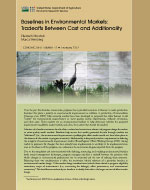Baselines in Environmental Markets: Tradeoffs Between Cost and Additionality
- by Elizabeth Marshall and Marca Weinberg
- 2/14/2012
Overview
Markets for farm-based environmental services are designed to allow farmers to sell "credits" for environmental improvements in water quality, carbon sequestration, wetlands restoration, and other areas. These markets use an environmental baseline to help determine whether proposed improvements qualify for market credits, and, if so, the number that should be awarded. Selection of a baseline is often a critical and contentious element in the design of environmental service markets. Due to the complexity and costs associated with defining, measuring, and verifying environmental baseline levels across heterogeneous landscapes, program managers may face a tradeoff between the precision with which changes in environmental performance can be estimated and the cost of refining those estimates. This brief focuses on the issues involved in measuring baselines, the strengths and weaknesses of alternative types of baselines, and the tradeoffs involved when selecting a baseline to measure environmental improvement.
Download
-
Entire report
Download PDF -
Download EB18.zip
Download ZIP
We’d welcome your feedback!
Would you be willing to answer a few quick questions about your experience?

